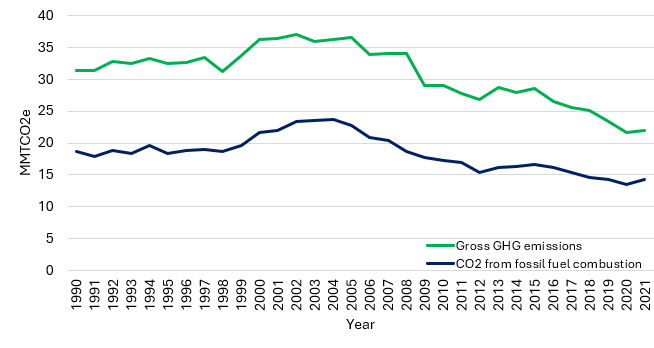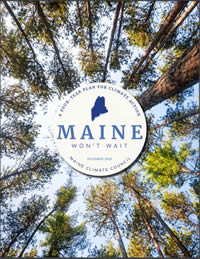Home → Sustainability → Climate Change → Mitigation Actions
Mitigation Actions
- Overview
- What is being done in Maine to reduce greenhouse gas emissions?
- Quick History
- Groups, Activities, and Updates
- References and Further Resources
Mitigation actions reduce the rate of climate change through strategies that reduce greenhouse gas sources and emissions, and enhance greenhouse gas storages. These interventions are taken, in part, to reduce the severity of impacts from the changing climate.
Activities to integrate these strategies generally focus on these topic areas:
- Tracking Energy Usage
- Setting Reduction Targets
- Education and Public Outreach
- Carbon Management and Sequestration
- Materials Management
- Agriculture and Forestry and Land Other Land Uses
- Energy Generation, Supply, Transmission, and Distribution
- Transportation and Land Use
- Buildings, Facilities, and Manufacturing/Industrial Sector
Greenhouse Gas Emissions
The total amount of greenhouse gases emitted into the atmosphere by human activities is tracked and reported on in Maine, in the U.S., and internationally. Key emissions reporting entities for each respective geographic region are: the Maine Department of Environmental Protection (State of Maine), the U.S. Environmental Protection Agency (National), and the Intergovernmental Panel on Climate Change (International).
International:
Sixth Assessment Report: Working Group III Report, Mitigation of Climate Change
United States:
Inventory of U.S. Greenhouse Gas Emissions and Sinks, U.S. Environmental Protection Agency
Maine:
The Department provides this biennial report to the Legislature, evaluating the State's progress toward meeting our reduction goals (38 M.R.S.A. § 578).
Tenth Biennial Report on Progress toward Greenhouse Gas Reduction Goals, June 2024, Maine Department of Environmental Protection


For more info on emissions inventorying and monitoring in Maine, reference DEPs Emissions Inventory Program.
What is being done in Maine to reduce greenhouse gas emissions?
Maine has established goals to reduce GHG emissions statewide (Maine law (38 MRS §576-A). Currently the state is on track to meet this voluntary commitment.

Maine Won't Wait, A Four-year Plan for Climate Action, December 2020
The 2020 Maine Won't Wait Climate Action Plan is the product of the Maine Climate Council, supported by six working groups and two subcommittees that began work in September 2019.
Key Finding:
Consistent and bold action on climate, over the next four years and into the decades beyond, will create a better future for our state and the next generations. It will create thriving new economic sectors - from clean energy and efficiency to the forest products economy of the future, while ensuring a clean environment. It will save money for Maine people, towns, schools, and business each month from lower heating bills. It will improve rural transportation systems and open access to food grown and harvested by our fellow Mainers. Every individual, business, organization, and leader in Maine can play a role in making this plan a reality. This collective effort will be key to our success against the crisis that climate change poses for our state, nation, and world. (p 7)
Quick History of Climate Action Work in Maine
| 2000 | Maine Climate Action Plan, Maine State Planning Office | ME SPO |
| 2001 | NEG/ECP Climate Action Plan | NEG/ECP |
| 2003 | LD 845 "An Act to Provide Leadership in Addressing the Threat of Climate Change" CHAPTER 237: Sec. 1. 38 MRSA c. 3-A |
121st Legislature |
| 2004 | Maine Climate Action Plan | DEP |
| 2005 | Regional Greenhouse Gas Initiative Memorandum of Understanding | RGGI |
| 2006 | First Biennial Report on Progress toward Greenhouse Gas Reduction Goals | DEP |
| 2007 | Maine adopts legislation and rules to implement Regional Greenhouse Gas Initiative | RGGI |
| 2008 | Second Biennial Report on Progress toward Greenhouse Gas Reduction Goals | DEP |
| 2010 | Third Biennial Report on Progress toward Greenhouse Gas Reduction Goals | DEP |
| 2012 | Fourth Biennial Report on Progress toward Greenhouse Gas Reduction Goals | DEP |
| 2014 | Fifth Biennial Report on Progress toward Greenhouse Gas Reduction Goals | DEP |
| 2016 | Sixth Biennial Report on Progress toward Greenhouse Gas Reduction Goals | DEP |
| 2017 | NEG/ECP Regional Climate Change Action Plan | NEG/ECP |
| 2018 | Seventh Biennial Report on Progress toward Greenhouse Gas Reduction Goals | DEP |
| 2020 | Eighth Biennial Report on Progress toward Greenhouse Gas Reduction Goals | DEP |
| 2020 | Maine Climate Action Plan: Maine Won't Wait, A Four-Year Plan for Climate Action | MCC |
| 2022 | Ninth Biennial Report on Progress toward Greenhouse Gas Reduction Goals | DEP |
Groups, Activities, and Updates
Regional Greenhouse Gas Initiative (RGGI)
Maine is a member of a cooperative effort by nine Northeast and Mid-Atlantic states to limit greenhouse gas emissions. RGGI is the first mandatory, market-based CO2 emissions reduction program in the United States. Participating states set a cap on CO2 emissions from the power sector and require emission reductions over a given period of time.
Maine Comprehensive Energy Plan
The Governor's Energy Office (GEO) is required to develop biennial updates of the Comprehensive State Energy Plan, which includes the interaction between energy planning and GHG reduction goals. The plan provides strategies for: addressing the state's most significant energy challenges; lowering energy costs; encouraging cost-effective renewable energy production; and, reducing the state's oil dependence. The plan also includes updates on wind energy development.
Renewable Portfolio Standards
The Renewable Portfolio Standards require that electricity suppliers obtain a percentage of their electricity supply from renewable and efficient sources.
Efficiency Maine Trust Annual Report & Trust Triennial Plan
EMT administers energy efficiency and limited renewable energy programs using a combination of electric & natural gas ratepayer funds, RGGI, and Forward Capacity Market (FCM) revenues. Specific GHG reductions are measured in many of these programs and reductions are reported by Efficiency Maine in its annual report. The Efficiency Maine Trust also prepares a strategic plan to provide integrated planning, program design and implementation strategies for all energy efficiency, alternative energy resources and conservation programs administered by the Trust.
New England Governors and Eastern Canadian Premiers
Regional Climate Initiative
Resolution 39-1, adopted by New England Governors and Eastern Canadian Premiers (NEG/ECP) in August 2015, established a 2030 GHG emission reduction marker range of 35–45 percent below 1990 levels for jurisdictions in the NEG/ECP region. This plan is a follow-up to the regional 2001 Regional Climate Change Action Plan.
- NEG/ECP Regional Climate Initiative, Coalition of Northeastern Governors (CONEG)
- Transportation and Air Quality
- The Transportation and Air Quality Action Plan: 2013-2020
Northeast Waste Management Officials' Association (NEWMOA)
NEWMOA is a non-profit association of state environment agency programs that address pollution prevention, toxics use reduction, sustainability, materials management, hazardous waste, solid waste, emergency response, waste site cleanup, underground storage tanks, and related environmental challenges in the northeast states. The association provides a strategic forum for effectively solving environmental problems through collaborative regional initiatives.
- Climate and Solid Waste
- What Can We Do as Consumers About Climate Change? Fact Sheet | Blog
Northeast State for Coordinated Air Use Management (NESCAUM)
NESCAUM is a nonprofit association of air quality agencies in the Northeast. The association provides scientific, technical, analytical, and policy support to their air quality programs to assist them with implementing national environmental programs required under the Clean Air Act and other federal legislation.
References and Further Resources
US Energy Information Administration
U.S. Environmental Protection Agency
- Greenhouse Gas (GHG) Emissions
- Develop a Greenhouse Gas Inventory (State, Local and Tribal Inventory Tools)
ICLEI Local Governments for Sustainability
- ClearPath Online software platform for completing greenhouse gas inventories, forecasts, climate action plans, and monitoring at the community-wide or government-operations scales
Southern Maine Planning and Development Commission
- GHG Inventory Protocol, SMPDC developed an inventory protocol to assist member municipalities with creating community wide GHG inventories
- Estimating On-Road Transportation Emissions